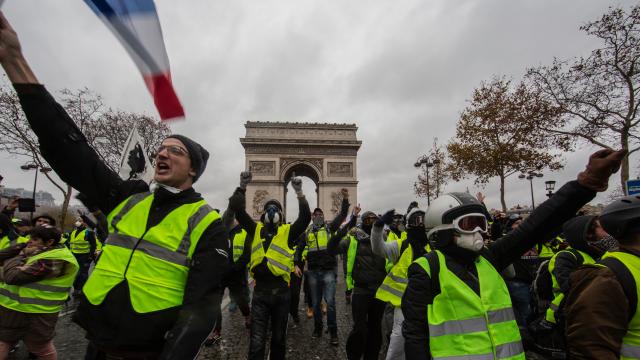France has turned into a bubbling cauldron of unrest over the past month as the so-called yellow vest movement has put up roadblocks and taken to the streets to protest a gas tax. Last week’s protests turned violent and facing a crisis, the government of Emmanuel Macron announced on Tuesday it would put a six-month moratorium on the tax.
The tax was meant to combat climate change and reduce carbon pollution. While it likely would’ve done that, it would’ve done so on the backs of France’s rural low and middle class. The mass revolt against it doesn’t mean those groups oppose climate action. It means that Macron needs to include them in discussions about the best way to address climate change as part of a just transition, something the world at-large is grappling with as it aims to get a handle on carbon emissions.
More than 280,000 protesters donned yellow safety vests that motorists are required to keep in their cars and took to the streets across France last weekend. The protests have arisen organically through Facebook and other social media platforms, and span the ideological divide.
Their focus has largely been on the unfairness of Macron’s proposed gas tax, which would’ve raised prices by $0.051 per litre on unleaded gas and $0.011 per litre a gallon on diesel. Rising oil prices have pushed fuel prices higher still now was among the worst times to propose such a tax.
The French government has spent years promoting diesel, and the tax would’ve left many already struggling to make ends meet with higher fuel bills on vehicles they’ve been encouraged to buy. The money it raised would also have been used to combat the national deficit, which has been made worse in part by the Macron government’s policies, like lifting portions of a wealth tax.
In short, the gas tax was a technocratic fix without any real constituency and the benefits were poorly explained, leaving it open to criticism and protest. The yellow vests enjoy a broad base of support with a recent poll showing that 72 per cent of the French public is sympathetic to the cause.
The fight against the tax is not a fight against climate policy, however. “We are not against the ecology, on the contrary,” Benoit Julou, a spokesperson for the yellow vest movement, said on a France 3 talk show last week. Rather it shows that any policies that only consider climate benefits and are made top-down are destined to fail.
“Governments need to communicate clearly why change in all sectors of the economy is necessary to limit global warming and how it plans to buffer potentially negative social and economic implications,” Alexander Reitzenstein, a policy advisor at the European think tank Third Generation Environmentalism, told Gizmodo.
“The French government did not provide a credible plan for how to compensate particularly poorer households. Poor households are often most affected by higher fuel prices, higher electricity bills or higher costs for keeping homes warm.”
Reitzenstein is part of a growing group of researchers, policymakers, and advocates pushing for a just transition when it comes to climate change. Simply put, this is a way to ensure people working in the fossil fuel industry or other industries dependent on fossil fuels, as well as low income and disadvantaged communities in general, aren’t left holding the bag as the world tries to get a handle on carbon emissions.
A just transition ensures that we create a world people want to live in and that everyone’s needs are accounted for.
Spain recently offered a central tenet of the Green New Deal proposed by Congresswoman-elect Alexandria Ocasio-Cortez. And it’s a theme of this year’s climate talks in Poland.
Reitzenstein, who is at the talks, said that the French protests have been a “hot topic” among the conference halls and meeting rooms as delegates grapple with the need to address climate change in the most equitable way possible.
Ivetta Gerasimchuk, a researcher at the International Institute for Sustainable Development, pointed to policies in Indonesia that ended motor fuel subsidies in 2015 as an effective example of what transportation policy could look like.
“President Joko Widodo included subsidy reform in his election campaign explaining all the benefits that these budgetary savings can unlock,” she told Gizmodo while noting it came at a time of low fuel prices. “Through this reform, Indonesia saved $21 billion and invested in budget increases for key areas including transport and other infrastructure and transfers to village.”
That illustrates some of the key principles Gerasimchuk said are part of just climate policies, including clearly communicating the benefits, engaging with communities, and building broad support. Macron could look at that as one avenue to build a new gas tax, but ultimately his government really needs to listen to the people in the streets. And those voices are speaking more loudly about the broader structural issues in France, many of which are found throughout the developed world associated with neoliberal policies that have driven inequality to some of the highest levels in modern history.
The rising inequality also means the richest 10 per cent of the world emit 50 per cent of its carbon pollution, shining a potential glaring spotlight on who should pay the most to address climate change.
“Just transition and ambitious climate policy are two sides of the same coin, there is no choice to either do just transition or climate ambition,” Reitzenstein said.
